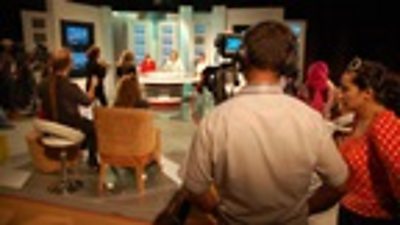Downloads
A research summary presenting findings from a study of two national television debates, produced and broadcast by ΒιΆΉΤΌΕΔ Media Action, in partnership with the Zambian National Broadcasting Corporation (ZNBC).
Publication date: September 2013
Project context
The government of Zambia has committed itself to achieving a transparent and accessible free press. This goal is challenged, in part, by journalistsβ reluctance to criticise government and their limited technical capacity to report government activity in a reliable, impartial and timely manner.
ΒιΆΉΤΌΕΔ Media Actionβs governance projects in Zambia aim to improve both the technical and editorial capacity of media partners, including ZNBC. The focus of this project was to improve on-air debate, bringing citizens and leaders together to discuss issues of local and national importance.
ZNBC produced and broadcast two debates focusing on womenβs rights, employment, education and health. The first was broadcast on UN World Day for Social Justice in February and the second was broadcast on the UN Day for Womenβs Rights and World Peace in March. Both debates were recorded before a live studio audience who directed questions to panellists from government and other organisations.
In February and March 2013, ΒιΆΉΤΌΕΔ Media Action, in partnership with the Zambian National Broadcasting Corporation (ZNBC), produced and broadcast two national television debates. The debates focused on the UN World Day for Social Justice and the UN Day for Womenβs Rights and World Peace.
The project
The aim was to provide technical and editorial support to ZNBC to produce quality debate programmes that brought leaders and citizens together. The result of the partnership was the debate programme The Forum, which was recorded with a live studio audience and broadcast nationally on radio and TV in February and March 2013.
Research approach
In 2013, ΒιΆΉΤΌΕΔ Media Action conducted a representative survey in Lusaka, as well as in Southern and Western provinces. The survey sampled 665 respondents aged 15 and older. The estimates for proportion of the population reached by the programmes for these provinces were then extrapolated to a further six, based on data from ΒιΆΉΤΌΕΔ Marketing Communications and Audiences, to provide a national reach figure. This approach was adopted to establish an estimate of national reach, without the resource intensive alternative of a nationally representative survey.
βThese debates are good because there is some kind of transparency. There are people who do not know what is going on in the constituency and such debates bring out real community issues.β - Female focus group participant
Key findings
- 1.1 million (16.2% of the adult population in Zambia) listened to or watched The Forum.
- 88.5% of those who listened to or watched The Forum believed it played a key role in holding government to account.
- 88.7% of those who listened to or watched the programme reported improved understanding on the governance issues covered as a result of the programme.
- Many participants felt the programmes fostered transparency among government and citizens.
- Some participants felt government panellists did not always answer the questions put to them in a satisfactory way, commenting some panellists became emotional in response to a question, rather than providing a solution.
Implications and impact
The Forum was watched or heard by 1.1milion people across Zambia. This estimate is based on hard estimates for three provinces and soft estimates for a further six. Soft estimate means that data from the three provinces was extrapolated onto the non-surveyed six based on platform audience reach data from ΒιΆΉΤΌΕΔ Marketing, Communications & Audiences. Most of The Forumβs audience reported improved understanding of governance-related topics covered in the programme and believed it played a key role in government to accountability.
Focus group participants reported the debates provided an opportunity to question officials on issues affecting their daily lives. Others remarked that particular features of the debate, such as the use of clips from communities on the quality of service provision at health clinics, was an opportunity for citizens to address leaders directly on issues affecting them and their community.
The presence of a live studio audience enabled a range of views to be represented in debates. However, participants stated a preference for the public to be able to submit questions in advance of the debate to enable those not in the studio audience to submit questions.
Participants also remarked that some of the panellists were too emotional to effectively debate or respond to an issue. In addition, government panellists were perceived as being too concerned with presenting their party manifestos, rather than discussing the issues citizens raised.
The insights from this research informed production and project teamsβ preparations to design further national debate programmes with the state broadcaster.
